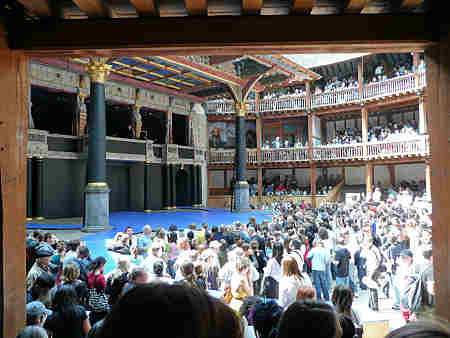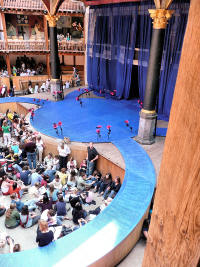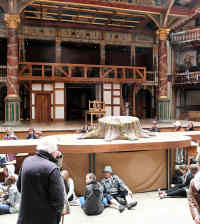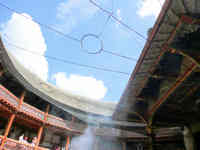| Home |
| Gaynor |
| Mike |
| Art |
| Theatre |
| Book Shop |
|
|||||||||||||||||||||||||||||||||||||||||||||||||||||||
|---|---|---|---|---|---|---|---|---|---|---|---|---|---|---|---|---|---|---|---|---|---|---|---|---|---|---|---|---|---|---|---|---|---|---|---|---|---|---|---|---|---|---|---|---|---|---|---|---|---|---|---|---|---|---|---|
|
|
|||||||||||||||||||||||||||||||||||||||||||||||||||||||
|
|||||||||||||||||||||||||||||||||||||||||||||||||||||||
|
Dominic Dromgoole's third season as Artistic Director of Shakespeare's Globe is called 'Totus Mundus'. Dromgoole explains that 'Totus mundus agit histrionem' (roughly 'The whole world is a playhouse') is thought to have been the motto of the first Globe. This year's productions 'celebrate the glorious unruly diversity' of the playwright's work. The season's productions are:-
|
|||||||||||||||||||||||||||||||||||||||||||||||||||||||
|
|
|||||||||||||||||||||||||||||||||||||||||||||||||||||||
|
The Globe´s twelfth season opens with Dominic Dromgoole´s own production of King Lear. I didn´t enjoy the 2001 production with Julian Glover, but this year David Calder plays the unwise king outstandingly. Calder has been a 'stalwart' of the Royal Shakespeare Company and the National for years, but I never felt that he would be able to convince in this most difficult role. He won me over very quickly though. I wasn´t moved by the final scene, but I saw the play very early in the run and it was nearly there. Not everyone in the cast is good, but a few stood out including Danny Lee Wynter´s sad Fool, Kellie Bright´s Regan and playing Kent another ´stalwart´ of TV, film and stage for as long as I can remember, Paul Copley. Claire van Kampen´s music is played on instruments of Shakespeare´s period, but ballad singer Pamela Hay sings hauntingly in Old English. Beautiful. I was not the only puzzled playgoer before the play when the balladeer walked up to a woman near to me and spoke to her, it seemed to me, quite sharply for a minute or so in what turned out to be Old English. After her encounter the victim looked at her partner and shrugged her shoulders. What was that about? The production received deservedly good reviews in the press, and Calder got special praise. |
|||||||||||||||||||||||||||||||||||||||||||||||||||||||
|
|
|||||||||||||||||||||||||||||||||||||||||||||||||||||||
|
This year´s production boasts Siobhan Redmond as Titania, Tom Mannion as Oberon, and is directed by Jonathan Munby. I´ve enjoyed Siobhan Redmond´s performances on TV for twenty years (I can´t believe it´s that long!). As in many productions of the Dream, Duke Theseus and Oberon King of the Fairies are played by the same actor (Mannion) as are their respective partners Hippolyta Queen of the Amazons and the Fairy Queen Titania (Redmond). The human couple are distinguished from their fairy counterparts by costume and by accent. Everyone appearing in the Athenean court is dressed in black matching the black painted frons scenae (back wall of the stage) and stage pillars. The two 'Royals' speak formally in a 'posh' English accent. When we leave the court for the woods four fairies dressed as rag dolls dance and sing and plant bright red flowers in the bright blue floor that covers the stage and curved ramps that extend into the yard. A blue diaphanous sheet drops over the whole frons scenae. In this setting Oberon and Titania wear richly coloured costumes and both speak in Redmond´s native Scottish accent. The young lovers start the play in the court dressed in black and are still in black when they appear in the forest, but at different times they each lose items of black outer clothing to show brighter attire beneath. I suspect that this is supposed to indicate stages at which they lose layers of sophistication in the wild forest setting. The lovers are suitably loud and frenetic, and the young ladies, Pippa Nixon as Hermia and Laura Rogers as Helena were anything but ladylike as they fought. Excuse a Geek moment here, but I´m fascinated by the two boys who originally played these and other leading female parts for Shakespeare. Here as in other plays the characters tease each other about the superior height of one and the darkness of the other. The Globe must have had two outstanding boy players with those characteristics and the audience would enjoy the joke running between productions. The rude mechanicals are also very entertaining. Paul Hunter as Bottom with added ears of wispy hair and extended teeth looks and speaks uncannily like comedian Ken Dodd (of the upright hair and long teeth!). Unusual for a scene change to stop the show, but when the fairies removed the flowers from the stage and dragged down the diaphanous blue backdrop for the final scenes set in the Duke´s court, they dragged it onto the stage, across the heads of the groundlings and out of a yard exit, there was a round of applause. But this production is an unusually jolly experience. There were few inaudible speeches and it was altogether a hilarious summer afternoon´s entertainment, which is just what a Globe comedy is about.
|
|||||||||||||||||||||||||||||||||||||||||||||||||||||||
|
|
|||||||||||||||||||||||||||||||||||||||||||||||||||||||
|
The first Shakespeare´s Globe production of his only comedy set in England is directed by Christopher Luscombe and designed by Janet Bird, the team responsible for The Comedy of Errors in 2006.
Personally I preferred The Dream but a hugely enjoyable afternoon at the Globe again, and several critics hailed this production as the best ever seen at Shakespeare´s Globe. I´m really pleased to be able to report not one, but at least two popular and critically acclaimed productions at the Globe this season, and Lear is no flop.
|
|||||||||||||||||||||||||||||||||||||||||||||||||||||||
|
|
|||||||||||||||||||||||||||||||||||||||||||||||||||||||
|
A new play written by Ché Walker is set in contemporary London inhabited by lost old men, unemployed actors, vegans and a reformed Christian, it is described as 'vibrant and blackly comic'.
|
|||||||||||||||||||||||||||||||||||||||||||||||||||||||
|
|
|||||||||||||||||||||||||||||||||||||||||||||||||||||||
|
Gaynor walked with me along the Southbank to the Globe for this last Shakespeare production of the season at the end of July. It was a fine, if not very summery afternoon, and when she had taken a few photographs she went on to visit her favourite bookshops. Timon of Athens is not produced very often and I have never seen it myself on stage, though I have seen the BBC TV version from the Eighties and more recently read about it. After the Corialanus produced by the same team of Lucy Bailey and designer William Dudley in 2006 it was obvious that this would not be a bare-bones production and it certainly isn’t.
As with all the William Dudley sets I have seen his work is a fundamental part of the production, not just a clever add-on, but everyone else contributes well, composer Django Bates, musicians, 'aerialists', and of course the actors. Timon is very well played by Simon Paisley Day. His is a role of two halves, generous beneficence in the first half and spiteful anger in the second. His faithful servant Flavius is Patrick Godfrey, an actor I have seen many times over the years, but the cast as a whole are good. Making a success of this piece which was partly written by Thomas Middleton is always difficult, but this production does hold the attention throughout. Good reviews from the serious papers, so all in all a very good season at the Globe. I'm sorry it's my last visit this year and look forward to 2009 with eager anticipation.
|
|||||||||||||||||||||||||||||||||||||||||||||||||||||||
|
|
|||||||||||||||||||||||||||||||||||||||||||||||||||||||
|
The final production of the season is a new play by Glyn Maxwell set in Revolutionary France in 1793. It is an adaptation in colloquial verse of Anatole France´s 1912 novel Les Dieux ont Soif.
|
|||||||||||||||||||||||||||||||||||||||||||||||||||||||
|
|||||||||||||||||||||||||||||||||||||||||||||||||||||||
|
|||||||||||||||||||||||||||||||||||||||||||||||||||||||
|
|||||||||||||||||||||||||||||||||||||||||||||||||||||||
|
|||||||||||||||||||||||||||||||||||||||||||||||||||||||




 When I last saw this play at the Globe I was at
first disappointed that the actor playing Bottom was
ill, but Mark Rylance announced that he would be
the understudy that afternoon and it became a unique
opportunity to see a superlative actor have fun creating
a role 'on the hoof' (pun intended).
When I last saw this play at the Globe I was at
first disappointed that the actor playing Bottom was
ill, but Mark Rylance announced that he would be
the understudy that afternoon and it became a unique
opportunity to see a superlative actor have fun creating
a role 'on the hoof' (pun intended). In that production, Gaynor and I
enjoyed Sarah Woodward´s performance and here she is
joined by Serena Evans to complete the merry pair of the
title. They get tremendous fun from their
cruel treatment of Christopher Benjamin´s Falstaff. One
almost feels sorry for the old rogue. Most of the
cast are strong and individual and funny. The
comedy is broad, likened by many to a modern situation
comedy, and I love to hear the audience roar at the rude
puns written four hundred years ago. Don´t believe
those who say there isn´t a single funny joke in
Shakespeare - they need the best acting to launch them like all the
best comedy.
In that production, Gaynor and I
enjoyed Sarah Woodward´s performance and here she is
joined by Serena Evans to complete the merry pair of the
title. They get tremendous fun from their
cruel treatment of Christopher Benjamin´s Falstaff. One
almost feels sorry for the old rogue. Most of the
cast are strong and individual and funny. The
comedy is broad, likened by many to a modern situation
comedy, and I love to hear the audience roar at the rude
puns written four hundred years ago. Don´t believe
those who say there isn´t a single funny joke in
Shakespeare - they need the best acting to launch them like all the
best comedy. The opening in the roof is strung
over with black netting with
a couple of holes. As the play starts black clad
figures clambered across the netting, perching
ominously above playgoers in the yard, making crow-like sounds.
During the play the 'birds' climb down to the stage
and join the action, but their most effective and
horrific part is at the end of the play when they
gather in even bigger numbers and swoop onto Timon emerging with blood covered mouths. We see no more
of Timon. The stage itself has been
extended to form part of a huge table at which Timon´s
so called friends sit to dine on plenty in the first
half and on stones and water in the second.
The opening in the roof is strung
over with black netting with
a couple of holes. As the play starts black clad
figures clambered across the netting, perching
ominously above playgoers in the yard, making crow-like sounds.
During the play the 'birds' climb down to the stage
and join the action, but their most effective and
horrific part is at the end of the play when they
gather in even bigger numbers and swoop onto Timon emerging with blood covered mouths. We see no more
of Timon. The stage itself has been
extended to form part of a huge table at which Timon´s
so called friends sit to dine on plenty in the first
half and on stones and water in the second.